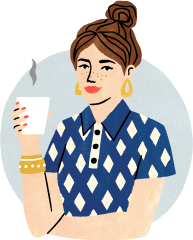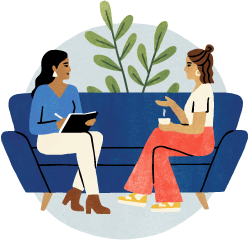Support Groups in Livingston
There are no results for support groups in Livingston
Check out support groups located nearby or offering teletherapy in Scotland below.More Groups Nearby
Do any of these sound familiar? Are you or your child: + Struggling to sleep through the night + Having difficulty falling asleep at bedtime + Only able to sleep in your bed. + Waking often during the night. + Not napping well during the day ....or has any other common sleep challenges, you qualify to receive a 15-minute sleep evaluation call for a suitable holistic CBT program that offers help from a personalized self help sleep guide to a 4 week personalized & supported program.

Hosted by Let Me Sleep
PhD
Verified Verified
Group meets in Edinburgh EH12
Sleep issues - With my sleep training in CBT (cognitive behavioural therapy), hypnotherapy & Angelic Reiki. I offer gentle methods to provide help for those who have sleeping issues, such as falling/staying asleep, insomnia & many other general sleeping concerns. If you struggling to sleep & wish a step by step method in an easy to follow program created by result proven strategies then I can help you. I offer 3 styles of help. My 1st is a 1-2-1 program in a 4-week program, working weekly to help you achieve better sleep. The 2nd is a D.I.Y. self-sleep guide, you complete it at your own pace. Finally a 3rd hourly sessions.
Safer space is a weekly open online therapeutic group. All adults are welcome. The maximum number of participants is eight. It operates on a donation model basis through Eventbrite. Full details are available here www.drandrewperry.org/group. Participants decide what and how we talk about things. I am happy to discuss before you buy a ticket.

Hosted by Andrew Perry
Psychologist, CPsychol
Verified Verified
Group meets in Linlithgow EH49
Hello, my name is Andrew Perry. I believe we can help each other. I specialise in helping by example. I offer free resources on my website, clinical supervision, outdoor therapy, an online therapeutic group and free initial online sixty minute consultations. It's ordinary to have times when we feel less healthy than others. Maybe you have experienced receiving help to feel healthier. People helped to rediscover the bravery to change their experience. People like us. I think everyone deserves help to feel healthier.
See more therapy options for Livingston
FAQs - About Group Therapy and Support Groups
How can I find a support group in Livingston?
Search for nearby support groups by inputting your city, postcode, or the name of the group into the search bar. From there, you can filter to find a group that suits your needs, whether you are looking for support for a teenager, a group that focuses on a specific issue, such as depression, or a particular program type, such as one geared toward developing social skills. To navigate between locations within the same country, enter a new city or postcode into the search bar.
How does group therapy work?
Therapy groups are led by one or more therapists and serve to help people process their experiences and learn from others who understand their challenges firsthand. They can be based on a specific issue, such as addiction, grief, physical illnesses, parenting, and caregiving. They can involve a specific type of program or therapy, such as a social skills group or CBT group. They can also be specific to a particular population or community, such as teens or LGBTQ.
Support groups, like Alcoholics Anonymous, also focus on a specific issue, but are typically led by members with lived experiences and are less structured than therapy groups. Most therapy groups will meet for a fixed length of time with a consistent group of members, while many support groups meet for an indefinite period of time with members coming and going.
Support groups, like Alcoholics Anonymous, also focus on a specific issue, but are typically led by members with lived experiences and are less structured than therapy groups. Most therapy groups will meet for a fixed length of time with a consistent group of members, while many support groups meet for an indefinite period of time with members coming and going.
What are the benefits of group therapy?
Support groups help connect people with shared challenges or physical and mental health conditions. In a group setting, participants can receive support and feedback from peers and can acquire new skills, strategies and perspectives by listening to one another. Discussing your experience with someone who also has a cancer diagnosis, or whose son also struggles with addiction, for example, can help you feel less alone, reduce distress, find empathy and connection, and learn practical or medical information that has helped others. Group therapy can also be a more affordable option than individual therapy and just as effective.
Is group therapy as effective as individual therapy?
Support groups can be deeply valuable for both emotional support and/or treatment outcomes. It’s difficult to make a blanket statement on efficacy due to the many different types of support groups and conditions treated, but group therapy has been found to be just as effective as individual therapy in establishing long-term abstinence for conditions such as substance abuse, addiction and alcohol abuse.
How much does group therapy cost?
Group counselling is typically less expensive than individual counselling, with each session costing on average between £45 to £60. Meanwhile, individual therapy sessions can run anywhere from £60 to £150. It is possible to find low-cost group therapy options and many therapists offer group sessions free of charge.
Does insurance cover group therapy?
If you have private insurance, your plan may cover some if not all of your group therapy sessions. You should contact your insurance provider to determine if they provide coverage for group therapy sessions and to determine what, if any, requirements they might have in order for your sessions to be covered, such as a referral from your GP or medical specialist.
How long does group therapy last?
The length of a support group session is often one hour but can fall anywhere between 45 minutes and two hours. The amount of time that people remain in a support group varies based on their specific needs and goals and the type of therapy. Some individuals may seek a shorter-term group, such as a bereavement group, that may last between six and 20 weeks. Some may seek a longer-term group that lasts for a year or indefinitely.
What are the limitations of support groups?
Support groups have many benefits, but there are a few limitations as well. Support groups do not constitute formal therapeutic or medical treatment, and are not run by licensed mental health professionals, so some people may opt for group therapy or individual therapy instead. Additionally, support groups can depend on the other participants, so a disruptive individual has the potential to mar the group dynamic, and the anecdotal information shared may sometimes be unhelpful or inaccurate. Because it is a group setting, confidentiality can be more difficult to guard and participants receive less personalized attention than they would in an individual therapy session.

